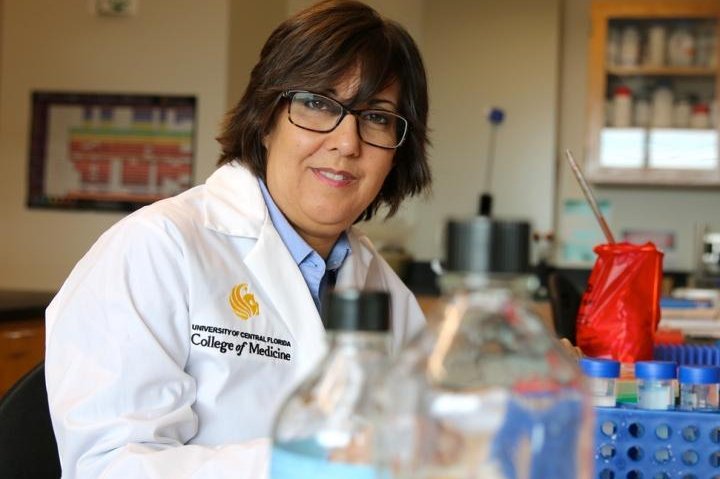Annette Khaled, who discovered the peptide CT20 can kill fleeing metastatic breast cancer cells, works in her lab at the University of Central Florida in Orlando. CT20 has been licensed for development and is expected to enter clinical trials sometime in late 2017. Photo by University of Central Florida
ORLANDO, Fla., Aug. 24 (UPI) -- Cancer is a challenging disease, made more challenging by the potential for tumors to become metastatic, when cells spread to other areas and grow into secondary tumors.
A new method for catching fleeing breast cancer cells and preventing metastasis may be on the horizon if a unique peptide discovered by researchers at the University of Central Florida proves successful in trials expected to start later this year.
The peptide, called CT20, was discovered in 2012 by Dr. Annette Khaled, a researcher at UCF, and licensed earlier this year by SEVA Therapeutics for development after she'd shown in previous research it disrupts the function of metastatic cancer cells.
"These discoveries have the potential to change the paradigm of how the metastatic breast cancer and other invasive solid tumors can be treated, and represent a tremendous opportunity for unmet patient needs," Paul Krysiak, president and CEO of SEVA, said in a press release. "Our job, at SEVA Therapeutics, is now to translate this significant innovation into meaningful therapies and bring them to the marketplace for the benefit of patient and medical communities, as quickly as practically possible."
In a study describing the success of CT20 in the lab, published in the journal Clinical Cancer Research, the researchers show how CT20 disrupts the folding mechanism inside cancer cells, which is mediated by a chaperonin, preventing it from folding into a 3D unit and causing death.
Khaled said using the peptide to disrupt chaperonin function -- the higher levels of the mediator found in cancer, the more sick a patient is expected to be -- could lead to multiple methods of fighting metastatic cancer.
CT20 also does not kill healthy, non-cancerous cells, which Khaled said may translate to fewer, or less traumatic, side effects from the treatment when compared to other cancer therapies.
SEVA has licensed CT20, as well as a nanoparticle developed at UCF to guide the peptide to cancer cells, and will start safety tests of the drug before the end of this year, with the plan to start clinical testing in late 2017, according to the press release.















